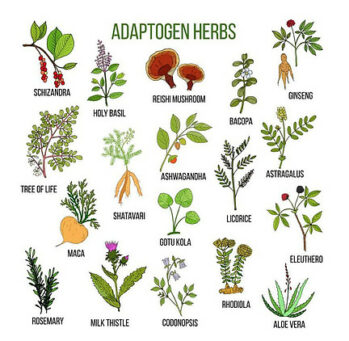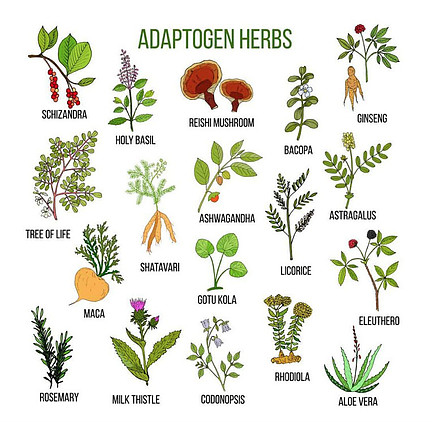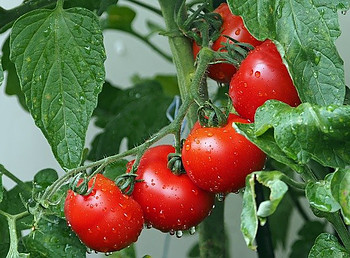What Are Adaptogenic Herbs – The History, Types and Uses

I first heard the word ADAPTOGENIC when I started taking Moon Balance and learning about the herbs in it. But what are adaptogenic herbs? They are a group of nontoxic plant herbs including some mushrooms that help support the body’s natural ability to deal with stress. The body uses adaptogens to help protect against mental, physical and emotional stress. I love learning about all these herbs and trying supplements containing them. Most recently I tried Moon Balance that has Shatavari and Maca in it. My article what is Shatavari explains many details about the herb Shatavari and how Moon Balance has helped me.

In Wikipedia the definition is, Adaptogens or adaptogenic substances used in herbal medicine for the claimed stabilization of physiological processes and promotion of homeostasis. There are very few human studies done in the US on adaptogenic herbs.
History of Adaptogenics
Here’s a timeline of the history of adaptogenics:
- 3000 BCE started the beginnings of Ayurveda in India and Traditional Chinese Medicine in China
- 2700-2600 BCE Chinese emperors send exhibitions into Siberia. Rhodiola was brought back. Reishi is reserved for the Chinese royal family
- 200 BCE the first major written classic of Ayuverdic medicine identifies 350 plants as valuable medicines including Amla and Holy Basil by Charaka Samhita
Charaka Samhita is the most important ancient authoritative writings on Ayurveda
- 77 CE a Greek physician names Dioscorides writes the text De Materia Medicia explaining the medical application of 600 plants including Licorice and Rhodiola
- 220 CE about 262 more medicinal herbs are recorded and used in China to include Ginseng, Astragalus and Reishi named after Shennong Herbal, the legendary originator of Traditional Chinese medicine
- 495 CE monks use Reishi to enhance meditation
- 790-1100 CE Rhodiola is used among the Vikings to enhance their physical strength and endurance during conquests
- 1000-1100 CE Chaga tea is being drank by Siberian people to improve digestion and detox and used as a soap
- 1948 a Soviet scientist Nikolai Lazarev officially coins the term “adaptogen” while trying to perfect all natural tonic for the Soviet Union during the Cold War
- 1958 Eleuthero is discovered by Dr. Lazarev and Dr. Brekhman to be a great adaptogen paving the way for many clinical studies and trials
- 1976/1977 more than 3 million people in Russia are using Eleuthero extract regularly and used by Russian athletes to prepare for the Olympic games. Also used by the space program for cosmonauts and Rhodiola is used for motion sickness.
- 1994 Dr. Brekhman formulates Prime One to enhance physical and mental performance which includes Eluethero, Schisandra, Rhaponticum, Rhodiola, and Licorice. More than 150 American athletes use Prime One at the Olympic games in Atlanta
- 2000 Adaptogenic herbs are gaining popularity among wellness enthusiasts and new research continues
List of Adaptogenic Herbs and Uses
- Holy Basil(India)-Helps to lower stress levels
- Reishi Mushrooms(China)-Help to boost immunity
- Asian Ginseng(China)-Helps with long term stress and hormone imbalances, boosts immunity
- Bacopa(India)-Helps improve memory, anxiety, ADHD and Alzheimer’s symptoms
- Licorice(Greece/Turkey)-Helps ease upper respiratory symptoms, treat ulcers, aid in digestion and is an antioxidant and anti-inflammatory
- Shatavari(India)-Helps female reproductive system, relieve menopause and PMS symptoms
- Milk Thistle(Greece)-Helps treat liver problems such as hepatitis, jaundice and gallbladder disorders, minimally reduce cholesterol

- Tree of Life Leaves(Jamaica/Madagascar)-Helps treat coughs, asthma, intestinal parasites, headaches and colic
- Maca (Peru)-Helps enhance fertility, improve energy and stamina
- Rosemary(Asia)-Helps improve muscle pain, memory, promote hair growth and boost immune and circulatory system
- Aloe Vera(Arabian Peninsula)-Helps treat constipation, skin conditions such as acne, sunburn and psoriasis, reduce itchiness and inflammation
- Ashwagandha(India/North Africa)-Helps with long term stress and hormone imbalances

- Schisandra(China)-Helps mediate fight or flight stress responses, improves liver function and gastrointestinal problems
- Gotu Kola(China/Indonesia)-Helps boost brainpower, promote liver and kidney health and heal skin issues
- Codonopsis(China)-Helps treat HIV infection and protect cancer patients from side effects of radiation
- Rhodiola(Europe/Asia)-Helps mediate fight or flight stress responses, improves energy, physical performance and memory
- Eleuthero(China)-Helps increase nervous system function and memory, athletic performance and aid in diabetes
- Astragalus(China)-Helps with conditions of diarrhea, fatigue, anorexia, upper respiratory, fibromyalgia and heart disease

Limited research has been done
Available in teas, capsules, liquid and powder forms
Do Adaptogens Really Work?
Check out this great informative video and book on Adaptogens from Dr. Tieraona Low Dog to find out and get more detailed information.
I hope you have a clearer understanding now about what are adaptogenic herbs. I can confirm they have helped me on numerous occasions especially my most recent experience taking Moon Balance. Please share your experiences here in the comment section below. I would love to hear from you.
As an Amazon Associate I earn from qualifying purchases. When you use the links on this page to make a purchase I may get a small commission and you may get a great bargain. It’s a win-win all around. Full disclosure. The information contained in this website is for educational and informational purposes only and is not intended as health or medical advice. Always consult a doctor.






Adaptogenic herbs, I can honestly say I have never heard this term before.
I’m all for anything natural when it comes to our health.
I use 6 of the mentioned herbs which are easy to get hold of, and to be honest never thought about the benefits until more recently, especially as I am going through a lifestyle change.
As for “Moon Balance” I will check this out further.
Thank you for sharing
@Mick thanks for visiting my blog today. I also hadn’t heard of adaptogenic herbs. So glad you could learn from my article. Best wishes.
Being a big fan of herbs this article was an education for me, I had never heard the term adaptogenic herbs before reading your article. I appreciate you sharing all the adaptogenic herbs in your article, and this was very helpful for me and I am sure for your other readers
Jeff
@Jeff thanks for visiting. I’m glad my article what are adaptogenic herbs was helpful to you and I also hope it’s helpful to other readers. Best wishes.
Great article. I absolutely love that and had never heard of this before. I hope you do not mind, but I have added this to my social media posting schedule.
This makes a lot of sense because so many of these herbs are known for having such amazing health benefits.
I have been wanting to learn more about herbalism, where would be a good place to start with this?
@Catherine I’m thrilled to hear you enjoyed my article! There are some great videos and books available on herbs. Also check out the blog at yoursuper.com. It’s very interesting all the facts and data they share about making their products.
Hi Alyse,
This is the first time I am hearing this term adaptogenic. You have done quite a research on your own and explained it in a simple way. I know some of these herbs such as Shatavari and Ashwagandha are used in India and mentioned in Indian Ayurveda books but never knew in details. It’ s a great read.
@Neel Thanks Neel! I appreciate you reading my article. Best wishes.
Hi Alyse, and thanks for this post. I found it very interesting!
I appreciate natural medicines and enjoyed learning the history behind them.
I knew they’d been around for a long time but didn’t realize how long, lol.
I’m especially interested in Shatavari from India. I suffer terribly from hot flashes and always looking for relief.
Do you know how that could be acquired in Canada?
Thanks so much,
Suzanne
@suzanne I’m glad you enjoyed my article. For more info about shatavari please refer to my article https://healthyfoodieonline.com/what-is-moon-balance-my-success-story-shared/ and use this link to purchase https://yoursuper.krym8q.net/nmm0V. I highly recommend Moon Balance for your condition. Best wishes. Please keep me posted how you like it.
Hello,
Well done on such an informative and interesting post. It’s great that you summarise everything in the bottom too. It seems to be China and India who have really embraced these adaptogenic herbs, Europe and America seem to be falling behind?
Thanks for sharing this in such a way that’s easy to understand.
Sharon
@Sharon I’m not sure about that but the climate or rules in China and India could have a factor in growing adaptogens. Best wishes for good health. Thanks for visiting my blog today.
I took Rhodiola for a few months back in late 2013 and early 2014 but wasn’t all that impressed with it – I heard that this plant extract helps to energise the system on a cellular level which seemed appealing, but the results that I saw in terms of increasing energy levels were minimal.
Super interesting! I don’t think I’d ever heard the term Adaptogens. The history is fascinating.
I found it especially interesting that the Russians kind of understood that these herbs were powerful. Other than their top politicians their Olympic athletes and Cosmonauts were the people they wanted to get all of the very best care possible. I wonder why they understood the value of these herbs but the US didn’t seem to ‘get it’?
@Glenn I agree, it is interesting. Stay tuned for my next article on the herb called Ashwagandha. Thanks for visiting again.